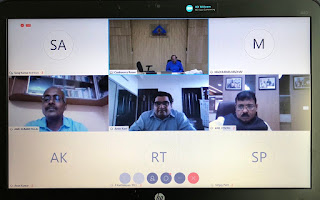“We live in a society that extols mobility, autonomy and freedom.”
~ Steven Mintz
Have you wondered how a person with a visual disability commutes from point A to point B? A lot of planning and inquiry goes into commuting, things that a person with a visual disability may take into consideration in terms of accessibility are:
Does the traffic light have a beeper for me to understand whether I can cross the road or not?
Are the sidewalks clear, safe and have proper Kerbs?
Do the sidewalks have tactile pavers or TGSIs?
In this article, we provide an overview of Tactile Ground Surface Indicators (TGSIs) and how the CABE Foundation recently identified and highlighted incorrect laying of TGSIs in one of the stretches being developed by a contractor in the Delhi Cantonment Board area and facilitated modifications in the same.
TGSIs have a specific function and impart specific information about the immediate surroundings. TGSIs act as, and are interpreted as landmarks. The two types of Tactile pavers that we use in India are warning indicators and directional indicators.
Tactile Warning Indicators (Dottype)/ Tactile Warning Blocks. Warning indicators, as the name suggests, warn of either a hazard or a destination.
Tactile Guiding Indicators (Linetype)/ Tactile Guiding Blocks Tactile guiding or directional indicators are used to direct the user from one point to another along a safe path of travel.
Tactile paving should be used on access routes to provide warning and guidance to people with visual difficulties. The need for TGSI’s is critical and requires to be laid out with a holistic integration with built environments. Partial and incorrect laying of TGSI’s may cause inconvenience and may be hazardous for persons with visual impairments.
TGSI’s should be well integrated and appropriately placed into external and internal spaces right from the inception stage of a built environment. It is recommended to make TGSI’s part of the access route plan. In essence, a clear continuous accessible path of travel is one that provides a dedicated pedestrian space which is free from barriers, hazards or obstructions read more here
On the 9th of June, CABE Foundation identified that the tactile pavements of the Delhi cantonment area are not placed as per the Harmonised Guidelines under the RPWD Act 2016. It was noticed by the team that the pavements were aligned very close to the edge whereas they need to be placed in the middle of the sidewalk for ease of access and to avoid any hazardous accidents.
Dear @ceo_delhi, Tactile pavers r2 guide & alert #blind users in public places & need to be installed as per the Harmonised Guidelines under #RPwDAct2016 by @CPWDGOV @NIUA_India & @MoHUA_India @socialpwds /Street Design Guidelines by @UTTIPEC of @official_dda. Its all wrong! pic.twitter.com/tpopyy5kw9
— CABE Foundation👩🏻🦯 👨🏻🦽🚴🏻♂️ 🚌 🛴 (@CABEIndia) June 9, 2022
~ Article 5.1.4., Harmonised Guidelines and space standards for barrier free built environments for persons with disability and elderly persons.
Quick Intervention
As the above was brought to notice of the Court of the State Commissioner of Persons with Disability, NCT of Delhi. On SCPD’s intervention basis CABE Foundation’s intimation – a quick intervention was undertaken by the CEO Delhi Cantonment Board within a week’s time to rectify the ongoing project of sidewalks development within a week’s time,
ChallengesGlad to see the quick response of @ceo_delhi to have made amends & begun re-laying of tactile pavers on the #sidewalk after it’s wrong placement was reported to @ScpdDelhi. Request DCB to rectify other stretches also as per the mandate of #RPwDAct @MSJE_AIC. @NIUA_India @CPWDGOV https://t.co/8v6x0Z5EHn pic.twitter.com/8vKjjgmrSw
— CABE Foundation👩🏻🦯 👨🏻🦽🚴🏻♂️ 🚌 🛴 (@CABEIndia) June 16, 2022
The whole process also highlighted that there are still many areas for improvement as all the other pavements in the cantonment have been constructed in a similar manner.
Recommendation
Standards need to be kept in mind from the design stage itself to avoid future costs of time and efforts. In addition, it is essential that training of all the stakeholders i.e. the Management, Engineers, Contractors and their staff need to be ensured before undertaking the implementation of accessibility initiatives.
CABE Foundation strongly believes in standardising the accessibility of built environments in all sectors. We provide accessibility training as well to strive for an end-to-end impact. If you come across such instances, feel free to reach out to us. You can get in touch with us if you need handholding in implementing accessibilty iniatiatives in your institution.












